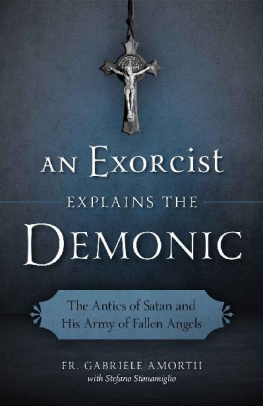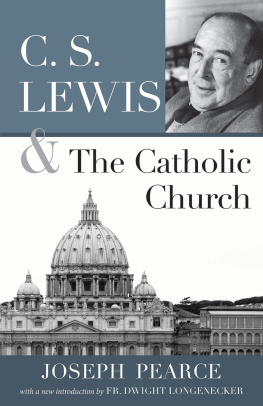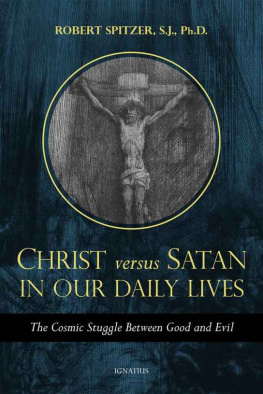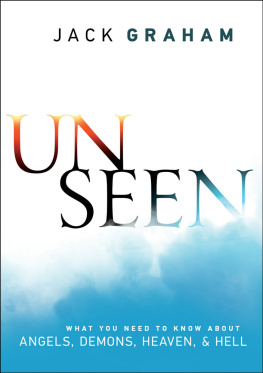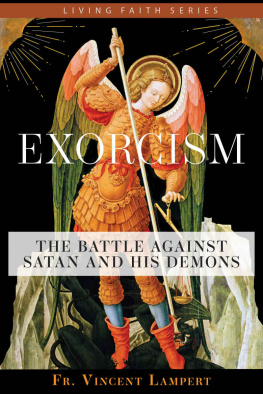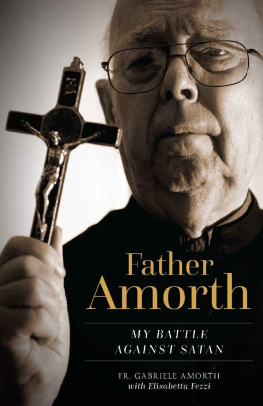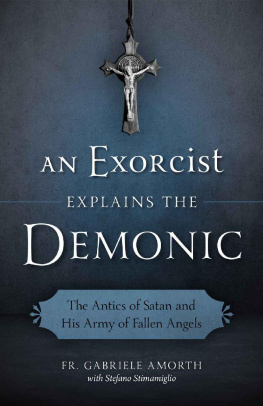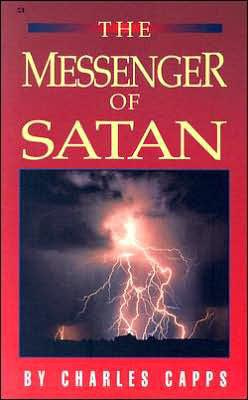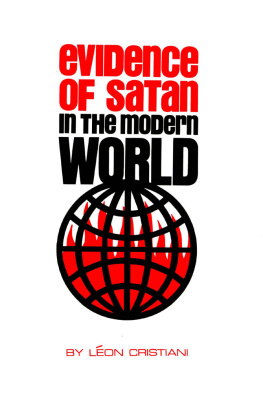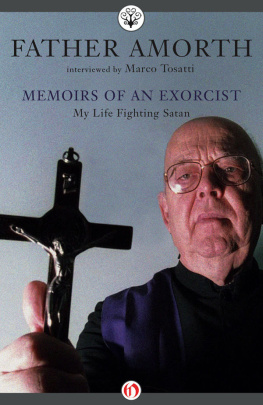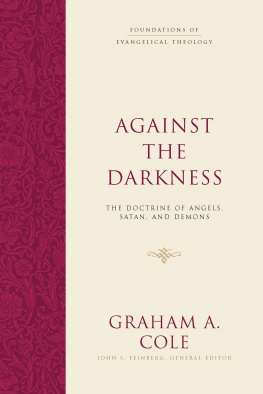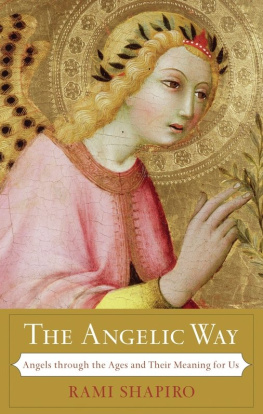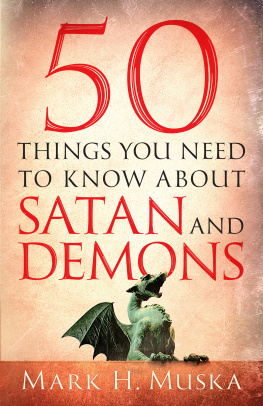GABRIELE AMORTH

The Antics of Satan
and His Army of Fallen Angels
Edited by Stefano Stimamiglio
Translated by Charlotte J. Fasi
SOPHIA INSTITUTE PRESS
Manchester, New Hampshire
Copyright 2016 by Edizioni San Paolo
English translation Copyright 2016 by Charlotte J. Fasi
Printed in the United States of America. All rights reserved.
Cover and interior design by Perceptions Design Studio.
Cover art: Cross of St. Benedict (183365198) serav / Shutterstock.com; Concrete wall (120675925) Eky Studio / Shutterstock.com
Biblical references in this book are taken from the Catholic Edition of the Revised Standard Version of the Bible, copyright 1965, 1966 by the Division of Christian Education of the National Council of the Churches of Christ in the United States of America. Used by permission. All rights reserved.
English translation of the Catechism of the Catholic Church for the United States of America copyright 1994, United States Catholic Conference, Inc. Libreria Editrice Vaticana. English translation of the Catechism of the Catholic Church : Modifications from the Editio Typica copyright 1997, United States Catholic Conference, Inc. Libreria Editrice Vaticana.
Quotes from English translations of papal documents and addresses are from the Vatican website (w2.vatican.va) Libreria Editrice Vaticana. All rights reserved. Used with permission.
No part of this book may be reproduced, stored in a retrieval system, or transmitted in any form, or by any means, electronic, mechanical, photocopying, or otherwise, without the prior written permission of the publisher, except by a reviewer, who may quote brief passages in a review.
Sophia Institute Press
Box 5284, Manchester, NH 03108
1-800-888-9344
www.SophiaInstitute.com
Sophia Institute Press is a registered trademark of Sophia Institute.
Library of Congress Cataloging-in-Publication Data
Names: Amorth, Gabriele, author.
Title: An exorcist explains the demonic : the antics of Satan and his army of
fallen angels / Gabriele Amorth ; edited by Stefano Stimamiglio ;
translated by Charlotte J. Fasi.
Other titles: Saremo giudicati dallamore. English
Description: Manchester, New Hampshire : Sophia Institute Press, 2016.
Includes bibliographical references.
Identifiers: LCCN 2016021936 ISBN 9781622823451 (pbk. : alk. paper) ePub ISBN 9781622823468
Subjects: LCSH: Devil Christianity. Catholic Church Doctrines.
Classification: LCC BT982 .A4613 2016 DDC 235/.4 dc23 LC record available at https://lccn.loc.gov/2016021936
To St. Michael the Archangel The battle against the Devil is the
principal task of St. Michael the Archangel.
And [it] is still being fought today. St. John Paul II, May 24, 1987, during a visit to the
Sanctuary of St. Michael the Archangel, on Mount
Gargano, in the province of Foggia, Puglia (Italy) St. Michael the Archangel,
defend us in battle.
Be our defense against the
wickedness and snares of the Devil.
May God rebuke him, we humbly pray,
and do thou,
O Prince of the heavenly hosts,
by the power of God,
thrust into hell Satan,
and all the evil spirits,
who prowl about the world
seeking the ruin of souls. Amen.
Contents
Introduction
In the evening of life, we shall be judged on love [alone]. With this dazzling expression the great sixteenth-century mystic St. John of the Cross expresses theologically the same mysterious reality that Jesus presented to His disciples shortly before offering His life in redemption for mankind. Portrayed majestically by Matthew in chapter 25 of his Gospel, Jesus tells us that each thing we have done, or have not done, to each of the least of our brothers and sisters, we will have done, or will not have done, to Him (see Matt. 25:3146). Therefore, the last judgment issued on our life will be based on love. Indeed, we ourselves shall reveal the naked truth of our reality to all when we appear before Gods presence. This is the heart of Christian life: charity, mercy, and acceptance. At the sunset of our life, all that will remain is that particle of love that we have placed in each thing.
There is, however, another side to this coin: besides being judged on love, we shall also be judged by Love, that is, by God. Pope Francis, in declaring the Extraordinary Jubilee of Mercy, has expressed to all the Church indeed, to the entire world that the judgment that awaits us is a judgment of mercy. Mercy will always be greater than any sin, and no one can place limits on the love of God, who is always ready to forgive. Each man who seeks repentance and pardon is given the hope that no sin, no situation in life, and no human failure can be excluded from Gods love.
This message, laden with hope, is one that I intend to propose and to make my own, together with those who, like me, exercise the priestly ministry of exorcism those who do face-to-face battle with the devil in order to eradicate his extraordinary action from the lives of men. The enemy of the human race, who rebelled against God and who intends to bring all creation to perdition and destruction, also wishes to make us lose the hope of love and joy in each moment of our lives, including the final moment, when through Gods mercy, we shall have restored to us the possibility of redeeming ourselves, after having been separated by original sin from total communion with the Creator. The devil, through his ordinary action, which is temptation, and through his extraordinary action, which is the subject of this book, tries to destroy the confidence of each man and each woman to love and to be loved.
This book, which I have written with my confrere Don Stefano Stimamiglio, began with the desire to fill hearts with the hope that is based on the rock, the Word of God, that neither rain, nor the overflowing of rivers, nor the blowing of violent winds nor any other dramatic experience from which we could borrow metaphors can destroy (see Matt. 7:25). It casts light and I must say finally on much-discussed topics in the media in recent times: possession, vexation, obsession, and diabolic infestation.
The material we present here has been gathered from our interviews in Credere [magazine], published weekly under the title Dialogues on the Afterlife. These weekly installments presented in simple language the elementary concepts of the mysterious phenomenology tied to the cult of Satan and its spiritual remedies. Moreover, they placed these concepts in the necessary perspective of the final judgment of God on men and on history that is, on the illuminating, salvific events and [the life of ] Christ. And so we intend to furnish an essential summary of this topic and to make it accessible to the greater public in all its originality.
I shall begin with a general explanation of the victory of Christ over sin. Then I shall deal with the Catholic doctrine on the fallen angels; the foundation of Satanism, its cult, and its innumerable manifestations; its spiritual consequences; and its remedies. I shall conclude with some fundamental elements of Christian eschatology: the Passion of Christ, His descent into the darkening of Satan, and His return in salvific victory motives of great hope for all, but especially for those who suffer from the heavy consequences of evil spells, those whom I consider my friends and companions along the journey.
St. John of the Cross, Dichos Misericordia Vultus (Bull of Indiction of the Extraordinary Jubilee of Mercy), no. 3.

The Victory of Christ over Sin and Death
Next page
